Hypertension — also known as high blood pressure — is when the pressure in your blood vessels is too high.
For example, a blood pressure measuring 140/90 mmHg or higher can be serious if not treated; whereas normal blood pressure level is less than 120/80 mmHg.

Silent killer
Experts say that people with high blood pressure may not feel symptoms, and that is why it is referred to as a silent killer. And the only way to know is to get your blood pressure checked, according to the World Health Organization.
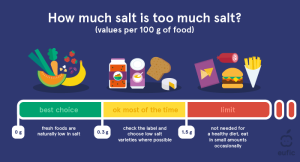
Causes of hypertension
The WHO says that things that increase the risk of having high blood pressure include:
- older age
- genetics

Symptoms of hypertension - being overweight or obese
- not being physically active
- high-salt diet
- drinking too much alcohol
Blood pressure reading

Blood pressure is written as two numbers. The first (systolic) number represents the pressure in blood vessels when the heart contracts or beats. The second (diastolic) number represents the pressure in the vessels when the heart rests between beats.
Hypertension is diagnosed if, when it is measured on two different days and the blood pressure readings on both days is 140/90 mmHg.
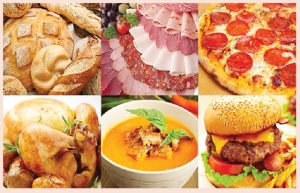
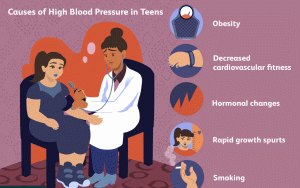
Risk factors
Physicians say that modifiable risk factors include unhealthy diets (excessive salt consumption, a diet high in saturated fat and trans fats, low intake of fruits and vegetables), physical inactivity, consumption of tobacco and alcohol, and being overweight or obese. 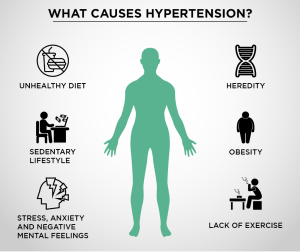
Non-modifiable risk factors include a family history of hypertension, age over 65 years and co-existing diseases such as diabetes or kidney disease.
Symptoms
Most people with hypertension don’t feel any symptoms. Very high blood pressures can cause headaches, blurred vision, chest pain and other symptoms.
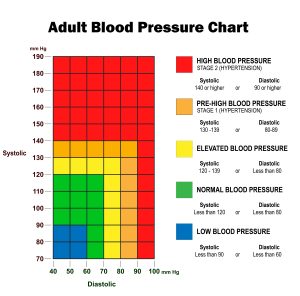
Checking your blood pressure is the best way to know if you have high blood pressure. If hypertension isn’t treated, it can cause other health conditions like kidney disease, heart disease and stroke.
People with very high blood pressure (usually 180/120 or higher) can experience symptoms including:
- severe headaches
- chest pain
- dizziness
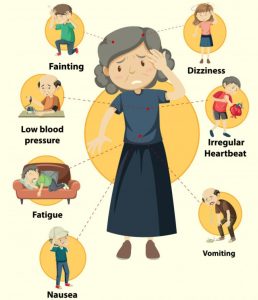
Hypertension symptoms to watch out for - difficulty breathing
- nausea
- vomiting
- blurred vision or other vision changes
- anxiety
- confusion
- buzzing in the ears
- nosebleeds
- abnormal heart rhythm
If you are experiencing any of these symptoms and a high blood pressure, seek care immediately.
Treatment
Lifestyle changes like eating a healthier diet, quitting tobacco and being more active can help lower blood pressure. Some people may still need to take medicines. Lifestyle changes can help lower high blood pressure. These include:

- eating a healthy, low-salt diet
- losing weight
- being physically active
- quitting tobacco
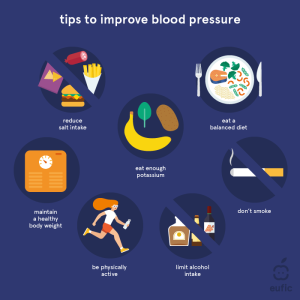
If you have high blood pressure, your doctor may recommend one or more medicines. Your recommended blood pressure goal may depend on what other health conditions you have. Blood pressure goal is less than 130/80 if you have:
- cardiovascular disease (heart disease or stroke)
- diabetes (high blood sugar)
- chronic kidney disease
- high risk for cardiovascular disease.
For most people, the goal is to have a blood pressure less than 140/90.
Prevention
Lifestyle changes can help lower high blood pressure and can help anyone with hypertension. Many who make these changes will still need to take medicine. These lifestyle changes can help prevent and lower high blood pressure.
Do: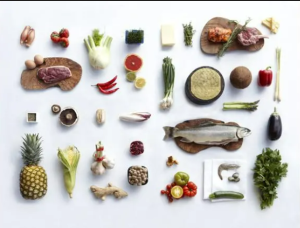

- Eat more vegetables and fruits.
- Sit less.
- Be more physically active, which can include walking, running, swimming, dancing or activities that build strength, like lifting weights.
- Get at least 150 minutes per week of moderate-intensity aerobic activity or 75 minutes per week of vigorous aerobic activity.
- Do strength building exercises 2 or more days each week.
- Lose weight if you’re overweight or obese.
- Take medicines as prescribed by your health care professional.
- Keep appointments with your health care professional.
Don’t:
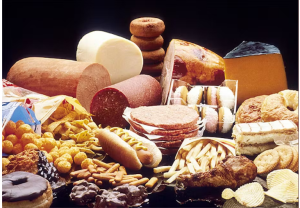

- eat too much salty food (try to stay under 2 grams per day)
- eat foods high in saturated or trans fats
- smoke or use tobacco
- drink too much alcohol (1 drink daily max for women, 2 for men)
- miss or share medication.
Reducing hypertension prevents heart attack, stroke and kidney damage, as well as other health problems. So, in addition to seeing your doctor, reduce the risks of hypertension by:
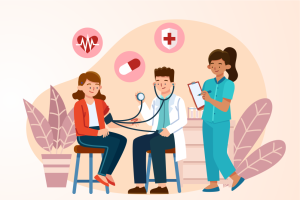
- reducing and managing stress
- regularly checking blood pressure
- treating high blood pressure
- managing other medical conditions.
This ⇓ ⇓ video is a summary of all that you’ve been reading so far, courtesy of Association of Community Pharmacists of Nigeria. Enjoy!


